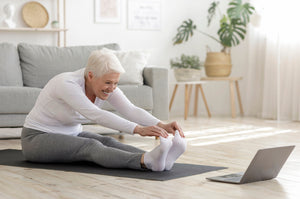5 Reasons Being Flexible Is Important for Health
February 23, 2021

When we think of being healthy & fit, oftentimes flexibility is something we tend to overlook, whereas building muscle or losing weight is what we end up focusing more on. However, you may be surprised to learn that flexibility is also an important factor in staying healthy. So what the benefits of being flexible and how flexible do you need to get?
Is Flexibility Important?
Yes it is. To a certain extent. Social media has often hyped the idea of flexibility to some extremely difficult and unattainable contortion of the body. However, for those of us who are quite stiff, you'll be glad to know that you don't actually have to reach that point of flexibility...unless you really want to. So how flexible do I need to be? Well as flexible as your lifestyle requires it. You should be flexible enough so that you can comfortably complete day to day tasks without pain. For example, putting on your socks & shoes, reaching for those cups on the top shelves, and so forth requires a measure of flexibility. So, if you find yourself feeling pain while doing these simple day to day tasks, then perhaps it's time to get stretching and working on your flexibility.
Benefits of Flexibility
Most of us may warm up prior to working out, but may skip out on the cool down portion. However, those precious extra few minutes we spend to stretch out our muscles after a rigorous workout can tremendously help improve your flexibility over time! Here are five top benefits of working on your flexibility:
1. Reduces Injuries
When you are flexible, it can help your body withstand more physical stress and allow it to move smoothly without the pain and aches. When you are flexible, your muscles are more fluid and less prone to injury.
2. Improves Posture
Have you found yourself hunched over your computer after a long day's work? Is your posture getting increasingly slumped? Are you feeling more aches and pains in your neck and back? Well, it could be a result of poor posture that we are training our bodies with. Our bodies adapt to the postures we are most often in, which can cause our muscles to become tighter. That is why those who work in a sitting environment tend to become more and more stiff. Poor posture can significantly affect our overall health such as our blood circulation, how we feel about ourselves, and even our mobility as we grow older!
3. Reduces Stress
Stress has a negative impact on our overall health. It can affect our digestion, mood, and sleep. One of the best ways to help release some of the stress we have is to spend a few minutes each day to do some stretches. Taking the time to get a good stretch not only feels great but it also helps to relieve tension in our muscles. You can try incorporating some relaxing stretches prior to bed to help ease into sleep.
4. Supports & Prevents Back Pain
When your muscles are tight, it is easier to feel aches and pains in certain parts of your body. It can decrease your mobility and increase your likelihood of straining your muscles in your back. When you properly stretch, it can help heal an existing back injury and help support your back. When your muscles are overly tight, your joints and your range of motion are more restricted which can lead to muscle pain.
5. Improves Athletic Performance
Flexibility can help improve your circulation and your range of motion which can enhance your performance on your next workout. In addition, when your blood circulation increases, it can help your body to heal quicker. Flexibility can also lead to improved performance in certain sports. For example, greater flexibility can help a golfer achieve a larger back swing, which potentially can lead to a more powerful swing.
How to Start
It's good to warm up a bit prior to stretching so that you minimize your chances of injury, especially if you are very stiff. Here are some tips to keep in mind while stretching:
1. Don't hold your breath during the stretch. Breathe normally.
2. Hold the stretch for 15-30 seconds intervals. Relax and repeat the stretch 2-4 more times.
3. Avoid bouncing while stretch. Instead hold the stretch to minimize the risk of injury.
4. Don't overdo it. Don't strain or push your muscles too far. If it's starting to hurt, ease up.
5. If you want to attempt more advanced stretches, it would be wise to have a qualified professional assist instruct you.
The Takeaway
A measure of flexibility can help with your overall wellbeing so the next time you workout or right before you hop into bed, incorporate a few minutes of stretches. You don't need to go to the extreme, but having a balanced level of flexibility can do a lot for your body!
